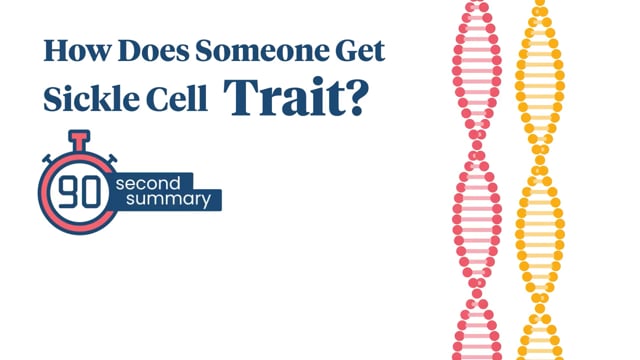Sickle Cell Trait
What Is Sickle Cell Trait?
Sickle cell trait is a blood condition that gets passed down through some families in their genes. It can’t turn into sickle cell disease and it doesn’t usually cause health problems.
A person has sickle cell trait when they inherit a copy of the “sickle cell gene” from one of their parents. With only 1 copy of the sickle cell gene, they don’t have sickle cell disease, but they can pass a copy of the gene to their children.A person with sickle cell trait is also called a “carrier.”
How Do Sickle Cell Trait and Sickle Cell Disease Differ?
Sickle cell trait doesn’t usually cause health problems. Problems are rare and usually can be prevented.
Sickle cell disease is a blood disorder where red blood cells are curved instead of round. The curved cells can get stuck in and block small blood vessels. Blood can't flow normally, which can lead to pain and organ damage. People with sickle cell disease need lifelong medical care.
How Does Someone Get Sickle Cell Trait?
To understand how someone gets sickle cell trait, it helps to know about the beta-globin gene.
Everybody has 2 copies of the beta-globin gene that they inherit, one from each parent. Beta-globin genes tell the body how to make hemoglobin (HEE-muh-glow-bin), a protein in red blood cells that carries oxygen. One type of beta-globin gene that someone can inherit is called the sickle beta-globin gene (or “sickle cell gene,” for short).
A person gets sickle cell trait by inheriting a normal beta-globin gene from one parent and a sickle beta-globin gene (sickle cell gene) from the other parent.
A genetic counselor can explain how sickle cell trait, sickle cell disease, and other blood disorders can run in families.

(AD) How Does Someone Get Sickle Cell Trait?
Sickle cell trait is genetic. That means it gets passed down in genes from parents to kids. Find out how it happens.
How Is Sickle Cell Trait Diagnosed?
To diagnose sickle cell trait, doctors use a blood test called hemoglobin electrophoresis (eh-lek-truh-fer-EE-sis).
In the United States, every newborn baby gets this test as part of newborn screening. Many other countries routinely test newborns too. A newborn screening can tell if a baby has sickle cell trait, sickle cell disease, or another problem with their hemoglobin.
People who don’t know their status can ask their doctor for a hemoglobin electrophoresis test. Sometimes, pregnant women who don’t know if they have sickle cell trait will get the test. This lets them know their baby's chances of having a hemoglobin problem.
When Can Problems Happen From Sickle Cell Trait?
Problems from sickle cell trait don’t happen often, but some situations can make them more likely, such as:
- when someone is severely dehydrated
- during or after extreme exercise (like intense athletic or military training)
- after an eye injury
- at high altitudes
What Problems Should I Watch for if My Child Has Sickle Cell Trait?
Call the doctor right away if your child has any of these problems:
- pain or weakness in muscles with exercise: If your child gets muscle cramps or weakness or feels exhausted or overheated with exercise, it's a sign to slow down and get medical help before it becomes an emergency.
- blood in their pee: Blood in pee might look pink, red, or brown. Usually, it's not from a serious cause. Rarely, though, it can be a sign of kidney damage or a type of kidney cancer called renal medullary carcinoma.
- pain on the left side of the belly or left shoulder: This can be a sign that the spleen isn’t getting enough blood.
- an eye injury: Some kinds of eye injuries can lead to high eye pressure, called glaucoma.
- pain that they can’t explain
What Can Help Prevent Problems From Sickle Cell Trait?
Not all problems can be prevented, but it can help for your child to drink lots of liquids and exercise safely. They should pay attention to how they’re feeling, and tell you if they see blood in their pee or have pain.
How Can Parents Help?
Take your child to all checkups. Their primary care provider can keep you updated on new discoveries about sickle cell trait. If your child sees other health care providers, be sure to tell them about the sickle cell trait. It's an important part of your child’s medical history, and this information can help them understand new symptoms, problems, or test results.
Teach your child about sickle cell trait. As they grow up, explain how sickle cell trait gets passed down in families. Teens can talk to a genetic counselor about this so they can plan for their future.
You can find out more online at:
Reviewed by: Melanie L. Pitone, MD
Date Reviewed: Mar 14, 2024
















